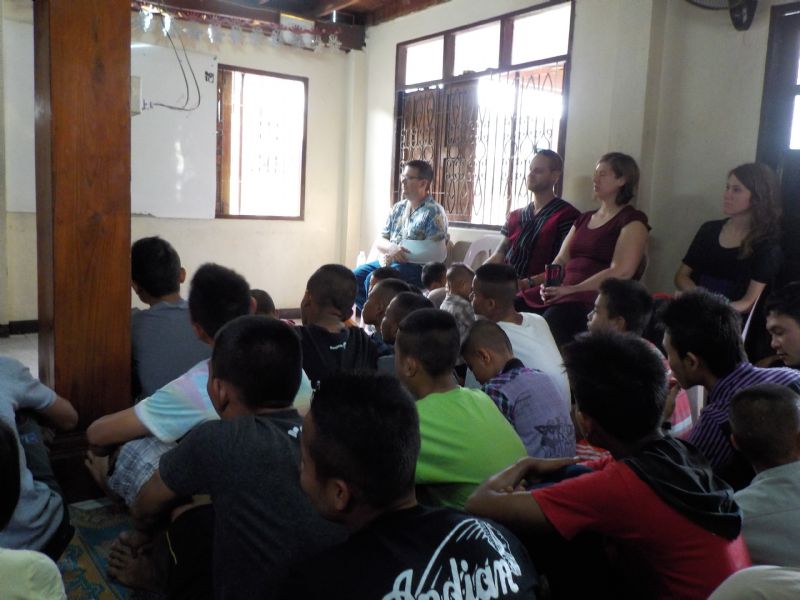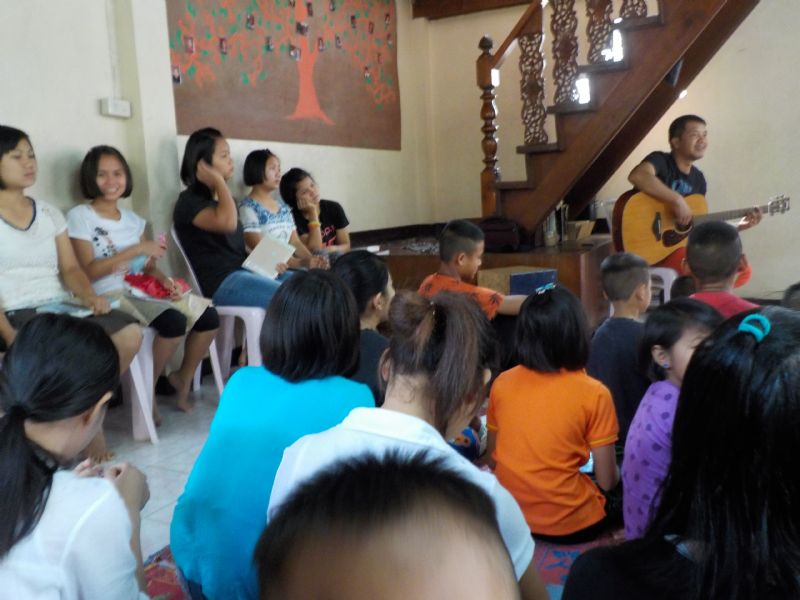For as long as I can recall, kids haven’t been a passion of mine. Sure, they can be fun to be around, more honest than grown-ups and easier to teach, but I’ve never been one to call myself a “kid-passionate-person”. Growing up, I had done the babysitting thing and the volunteering during summer vacation Bible schools thing and the lifeguarding thing (ok, that one is not as hands-on) and I even became a summer program counselor at the church camp I had attended. I am not a stranger to children. And yet…I pause at the statement: “kids are my passion”.
I mean, so many people love kids, right? Why don’t I have that same passion, that same point of view? Here’s a question: What does my lack of passion for kids say about who I am as a woman? …That’s a tough one. For a while I’ve gone back and forth about whether me feeling this way about kids is ok or not. Should I look to change my perspective? Am I really so in-control of my passions that I can even do that?
So many questions (if you know me, that’s nothing new)! I really don’t have answers for them. But what I want to tell you about here is a small realization I had about life and about children that came from a brief encounter with a 2-yr-old Burmese boy.

Jenny in Mae Sot, Thailand!
2 weeks ago, my team and I had a chance to visit a church service with a group of kids from a boarding children’s home. These kids have each been affected in some way by the on-going civil war in Myanmar and are refugees living in Mae Sot, Thailand. The organization we worked through in Mae Sot, over the last 2 1/2 weeks have partnered with this children’s home and made discipling and teaching them a priority of their ministry. It’s a very cool operation!
But honestly, for me, thinking about interacting with these kids was both exciting and unnerving. One the one hand, I was wanting to learn from them and hear more about their stories (which isn’t a desire unique to just children, but their lives seemed very different from the majority of people I’ve met, which gave me added curiosity). But on the other hand…they were kids! Not my natural habitat.
We went to the church service anyway (not that I put up a noticeable fight or didn’t want to go). Stepping out of the converted truck bed onto a gravel road, I eyed the kids’ house from across the street. Children meandered around in the courtyard, eying us back. Some of our group were visibly more comfortable breaking the ice and interacting with the kids (and some had already met them via a sports event the day prior). I stood back and watched my squad mates say hellos and give high fives. I was happy for them. Being around kids was their sweet spot.

The service started soon after and us foreigners surrounded the kids, who stood in the middle of the room. Worship began (musical instruments consisted of one non-microphoned guitar and over 30 voices joined loudly in praise… for all you who put worship in a high-tech, concert-looking box, take note). Shortly after, I felt a small hand come from behind me and squeeze my right arm.
Glancing around, I observed a small boy walking back and forth on the chairs behind us. This guy was not more than 2 (…like I know enough about kids to accurately assess age…). He held onto our arms so he wouldn’t fall as he walked back and forth, making a point to touch both of our arms even if he was perfectly safe walking from one chair to the next without help. This guy loved physical touch.
The heartfelt worship ended after a few songs and everyone sat down, us on the chairs and the kids on the floor. Not long after we had sat, our little friend came back again, this time sitting on my feet and touching my knees. I’ll confess I didn’t really know what to do. Do I ignore him and try to set a good example of someone who listens during a church service? Do I pick him up and put him on my lap so he doesn’t distract others? Do I quietly acknowledge his touch and smile at him and risk being culturally insensitive? I resigned to #3.
Not long after, a gal-friend of mine leaned over to me and, smiling, whispered, “He really loves you!”
I smiled back…and then paused………… Really?………. Is that what was going on here? This little, restless boy… loves me? I entertained the thought. …Maybe she was right… Maybe she was way off… Regardless, he kept playing with me and my squadmates. He didn’t not like the attention and playfulness.

During the church service with the little boy at the bottom of the picture.
And that got me thinking. I considered how complex a child’s thought-process is: it’s not! If a child likes something, they show it. If they don’t like something, they show it. If they’re confused about something, they show it. Young kids do very little hiding and a whole lot of “wearing your heart on your sleeve.”
In truth, I’ve always wondered what it would be like to wear my heart on my sleeve, to say what I mean and mean what I say, to be up-front and not mysterious.
Please understand I don’t mean saying everything that comes to my mind/heart. There’s plenty of Bible verses and common sense wisdom that advise against using rash words and acting without consideration. I’m not recommending taking off every filter we sift our thoughts/emotions through nor do I think we should. But man…sometimes it’s just necessary to say something because it’s true of what I think, what I feel, who I am or how I see!
I really love the lyrics to the song Slipping Away by Switchfoot. They seem to fit this moment:
“Remember that kid with the quivery lip
whose heart was on his sleeve like a first-aid kit?
Where are you now?
Where are you now?
Remember that kid didn’t know when to quit
I still loose my breath when I think about it.
Oh where’d you go?
Oh where’d you go?”
Oh where HAVE I gone?
I realized it is possible (and not only that, but beautiful) to be a spiritually mature adult who wears their heart on their sleeve. And the best part is God used a little, hands-on boy with too much energy to sit still to teach me just that.
The little boy who played with my hands, sat on my feet, fiddled with my watch, grabbed my arms and stared at me did what he wanted to do. Plain and simple. He wore his heart on his sleeve. He didn’t care if I liked it or not, he didn’t care if it was “proper” or “culturally sensitive”, he didn’t care if people were watching, he didn’t even care about the possibility that I could drop him while he was swinging from my arms!
Man, sometimes we need to live life this way!
“Having faith like a child” isn’t just a quaint little blurb about the carelessness and ignorance of kids (I don’t think kids are nessesarily either of those). It’s knowing when to throw caution to the wind and open ourselves up to living and loving extravagantly, even in the face of the possibility of being totally shattered, ignored or taken advantage of. It’s a call to stop acting, stop guarding ourselves (in a sense), stop cognitive dissonance and, instead, engage life as we are but with daring faith and confidence in Jesus’ sanctification of us as we go.
I think kids offer more than I give them credit for sometimes and maybe even teach me deeper things than I want to admit they do (I can be a stubborn punk, at times). It’s true my perspective on how I see kids and kids ministry didn’t change. God didn’t choose to alter anything with that during this time, but I do find myself being more willing to let kids teach me, which isn’t something I thought I needed.
God knows us, his kids, so well. Thank you, Lord.
(Here’s some additional, way more susinctly and intelligently-worded thoughts/food for thought on the matter by a man named Mike Mason, author of one of my favorite books “The Gospel According to Job”:
“Self-control is a vital quality in Christians – but not to the point where it complete eviscerates our passions. Is not God Himself an intensely passionate being? He loves passionately, He hates passionately, and there is absolutely nothing about which He is dispassionate. He is capable of passionate jealousy and passionate anger, and more than that there was a time (if we are to believe Genesis 6:6) when He grew so despairingly furious with mankind that He actually regretted having created us at all.
Because God’s feelings toward us are so strongly emotional, He respects strong emotion in a human being. He respects a person who, in pursuit of truth, can simply open his mouth and express the way he honestly feels inside. Yet how sad it is that so many who claim to believe in this God have also a fundamental suspicion of their own deepest feelings and instincts, an innate distrust of the very way in which they were made. Rather than living spontaneously according to the impulses of their hearts, such people end up conforming slavishly to external, pietistic images of expected behavior. With mature disciples of Jesus it is just the opposite. They are the ones who have learned to trust their own gut reactions, who know that it is all right (and at times essential) for what is in the gut to come out – not because there is anything fundamentally good or trustworthy about a human soul, but rather because, quite simply, in a true Christian that is where the Lord Himself has taken up residence: in the gut.”)








